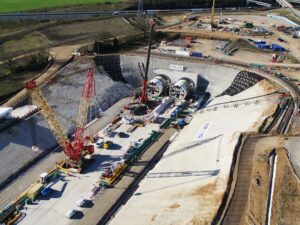Successfully Invest in Commercial Real Estate

Investing in commercial real estate (CRE) can be a lucrative opportunity for those looking to diversify their portfolios and build long-term wealth. Unlike residential real estate, which involves properties like single-family homes and apartment buildings, commercial real estate encompasses a variety of income-generating properties, including office buildings, retail spaces, warehouses, and industrial properties. In this blog post, we will provide the full details on how to guide you through the essential steps and strategies for successfully investing in commercial real estate.
Understanding Commercial Real Estate
Before diving into the world of commercial real estate, it’s crucial to understand what it entails. CRE properties are generally classified into several categories:
- Office Buildings: These include skyscrapers, business parks, and co-working spaces, which cater to businesses and professionals.
- Retail Spaces: This category includes shopping centers, malls, and standalone retail stores.
- Industrial Properties: Warehouses, distribution centers, and manufacturing facilities fall under this category.
- Multifamily Properties: While sometimes considered residential, properties with five or more units, such as apartment complexes, are often classified as commercial.
- Special Purpose: These properties serve a specific purpose, such as hotels, hospitals, or self-storage facilities.
Understanding these categories will help you determine where your interests and investment strategies lie.
Research and Education
Before making any investment, education is essential. Start by researching the commercial real estate market in your area or any location you are considering. Here are a few key points to focus on:
- Market Trends: Familiarize yourself with current market trends, such as demand for specific types of properties, rental rates, vacancy rates, and economic indicators.
- Local Laws and Regulations: Understanding zoning laws, building codes, and regulations is crucial for successful investment.
- Economic Indicators: Keep an eye on factors like employment rates, population growth, and local economic conditions, which can significantly impact the commercial real estate market.
Online courses, webinars, books, and local real estate investment groups can also provide valuable insights into the industry.
Developing an Investment Strategy
Once you have a solid understanding of commercial real estate, it’s time to develop an investment strategy. Here are some strategies to consider:
- Value-Add Investing: This approach involves purchasing properties that need renovations or improvements. The goal is to increase the property’s value through upgrades and improvements, allowing you to command higher rents and ultimately sell for a profit.
- Core Investing: This strategy focuses on purchasing stable, income-producing properties with low risk. These properties typically have high occupancy rates and long-term leases.
- Opportunistic Investing: This involves higher risk, with the potential for higher returns. Investors may buy properties in emerging markets or those requiring significant redevelopment.
- Build-to-Suit: This approach involves developing a property tailored to a specific tenant’s needs. While it requires more upfront capital and a longer timeframe, it can yield significant returns.
- Joint Ventures: Partnering with other investors can help you pool resources, share risks, and leverage each other’s expertise.
Financial Planning and Budgeting
Creating a solid financial plan is essential for successful commercial real estate investment. Here are some steps to follow:
- Determine Your Budget: Assess your financial situation to establish a clear budget for your investment. Consider factors like down payments, renovation costs, and ongoing expenses.
- Explore Financing Options: Investigate different financing options, such as traditional mortgages, commercial loans, or private equity financing. Compare interest rates, terms, and conditions to find the best fit for your investment.
- Analyze Cash Flow: Conduct a thorough cash flow analysis to estimate potential rental income, operating expenses, and net income. A positive cash flow is critical for long-term success.
Finding the Right Property
Finding the right property is one of the most crucial steps in commercial real estate investment. Here are some tips to guide you:
- Utilize Professional Networks: Connect with real estate brokers, agents, and industry professionals who specialize in commercial properties. They can provide valuable insights and help you identify potential opportunities.
- Conduct Thorough Due Diligence: Once you find a property that interests you, conduct a thorough analysis. This includes evaluating the property’s physical condition, examining lease agreements, and reviewing financial statements.
- Consider Location: The location of a commercial property can significantly impact its value and potential for growth. Look for properties in areas with strong economic fundamentals, good infrastructure, and access to transportation.

Understanding Lease Structures
Commercial leases differ significantly from residential leases. Familiarize yourself with common lease types, including:
- Gross Lease: The landlord covers all property expenses, including taxes, insurance, and maintenance, while the tenant pays a fixed rent.
- Net Lease: The tenant is responsible for some or all property expenses in addition to rent. Variants include single net, double net, and triple net leases, each specifying different responsibilities for tenants and landlords.
- Percentage Lease: Common in retail, this lease structure includes a base rent plus a percentage of the tenant’s sales.
Understanding these lease structures will help you negotiate favorable terms and protect your investment.
Building a Team
Successful commercial real estate investing often requires a team of professionals. Consider assembling the following experts:
- Real Estate Broker: An experienced broker can help you find suitable properties and negotiate deals.
- Property Manager: If you plan to own multiple properties, hiring a property manager can help handle day-to-day operations, tenant relations, and maintenance.
- Accountant: A knowledgeable accountant can assist with tax strategies, financial analysis, and budgeting.
- Attorney: A real estate attorney can help navigate legal matters, including contracts, lease agreements, and compliance with local regulations.
Ongoing Management and Maintenance
Once you acquire a commercial property, ongoing management and maintenance are essential for maximizing returns. Consider the following:
- Regular Maintenance: Implement a proactive maintenance schedule to ensure the property remains in good condition. This helps retain tenants and can increase property value over time.
- Tenant Relations: Building strong relationships with tenants can lead to longer lease terms and lower vacancy rates. Open communication and addressing concerns promptly are key to tenant satisfaction.
- Market Monitoring: Continuously monitor market trends, economic indicators, and tenant needs to stay ahead of the curve. This allows you to make informed decisions regarding rent adjustments, property improvements, and potential expansions.
Conclusion
Investing in commercial real estate can be a rewarding venture, but it requires careful planning, research, and execution. By understanding the market, developing a clear strategy, and assembling a team of professionals, you can navigate the complexities of commercial real estate and set yourself up for long-term success. Whether you’re a seasoned investor or just starting, staying informed and adaptable is key to thriving in this dynamic industry. Happy investing!



